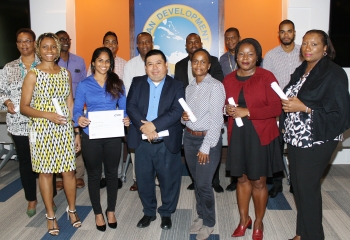Permit me to extend my deepest appreciation to the Ministry of Foreign Affairs for the opportunity to address this gathering of international partners during Diplomatic Week 2023, and advocate for the special needs of the Caribbean Development Bank’s (CDB) Borrowing Member Countries (BMCs), including St Kitts and Nevis.
Today, I want to focus the discussion on development strategies for Small Island Developing States (SIDS), on one element that has the most potential for propelling that development – trade. International discourse has underscored the significance of global trade (in particular, trade liberalisation) for growth and economic development – arguments I do not disagree with. However, I firmly believe that at this juncture, it cannot be “business as usual”. Consequently, I am proposing that we need a new deal in international trade if SIDS and other developing countries are to achieve prosperity and sustainability.
SIDS in the Caribbean owe their very existence to trade. Regrettably, over multiple centuries the structures, terms, and conditions have ranged from we ourselves being the commodity traded to the post-colonial systems that went from no rules to regulations, under which our small size and remoteness made it nearly impossible to compete.
Those disadvantageous attributes —disregarded by conventional economic theory, and now compounded by climate change induced vulnerability and low resilience to extreme shocks — are conspiring to relegate us to an existence characterised by “unattained potential owing to multiple crises”. In fact, for SIDS, the devastation of supply chain pressures from the COVID-19 pandemic and the inflationary impact of the Russia-Ukraine war are just the latest layers added to our development challenge.
With just 8 years left to achieve the Sustainable Development Goals, the shift needed in societies is urgent and significant, and the focus on people, planet, and prosperity has never been more relevant. This meeting allows us an ideal opportunity to re-imagine a development paradigm for SIDs that allows for social stability and sustainable livelihoods. We recognise that sustainable development requires resilient economies — that is, a resilience ecosystem spanning social, financial, environmental, institutional, and productive capacity dimensions. We believe this can be achieved only by integrating frameworks of debt sustainability, quality investment-growth nexus, and resilience building in a manner that ensures internal system coherence at any time but temporal consistency over time.
We believe Caribbean and other SIDS are ready to help themselves. Permit me therefore to highlight three pivotal handicaps that must be addressed to give competitors disadvantaged by current trade paradigms a fair shot.
1. Overturning Conventional Foundations
We can start by acknowledging that development implies the attainment of sustainable, resilient prosperity for citizens. This requires a holistic, systems approach to development and by extension building a resilience ecosystem. It implies reimagining the existing framework of designing policies to influence factors that increase activity (economic growth) to a framework of designing polices to improve internal resilience capacity. This promotes a focus on development outcomes, a break from development being simplified to growth, a break from using gross national income as the measure of development or as a tool for access to concessional finance or as a tool to determine capacity development, or as a tool to design the prioritisation of investment activity. I invite you to reimagine what if investment activities, access to affordable finance, and implementation capacity were all analysed and influenced by the internal resilience capacity of a country!
We can also agree that discussions on global trade have focused inordinately on trade in goods and the theory of comparative advantage — which ignores the value of technology and the value of intellectual property. As a matter of urgency, we must change this. The new deal, which I am proposing for SIDS, sees trade as rooted in knowledge creation (the process of accumulation, discovery, and strategic transformation) and driven by innovation, entrepreneurship, and technological sophistication. Through this “industrialisation of knowledge,” we can transform information into knowledge for the creation of intellectual assets. When underpinned with technology, these intellectual assets have the potential to create a competitive and comparative advantage that in conventional growth theory would be impossible due to our small size and limited natural resources. In short, industrialising knowledge provides a means by which small and medium economies can create products, markets, and industries that can drive agility while promoting economic diversification. This will require establishing a governance framework that allows developing economies to compete internationally in knowledge-based industries. In the Caribbean, and other regions, intellectual property frameworks must evolve into more balanced, coherent, relevant, and responsive structures to be fit-for-purpose in the global environment. We must institute greater provisions under our patent laws to address both economic and humanitarian needs. Correspondingly, international trade arrangements should ensure rightful remuneration for intellectual assets and artistic works from international markets.
Equally, there is need for a different type of partnership between private and public sectors — a Partnership for Prosperity and Profits. By this I mean a partnership for development aimed at reducing policy uncertainty, advocating transparency, and enhancing implementation capacity throughout the project cycle of origination, design, execution, and evaluation. This can forge mission-oriented activities, galvanise complementarities, and build trust for joint prosperity.
2. Connectivity
Connectivity is key to increasing the trade footprint of SIDS, allowing greater access to markets for monetising goods, skills, and services. Digital connectivity must be leveraged to strengthen capacity and create modernised trade systems to ensure that SIDS can competitively and effectively engage trading partners. Beyond systems, digital connectivity allows businesses in the developing world to exploit the new norm of unlimited boundaries — that is, unconstrained by the limitations of physical jurisdictions. This emphasis on connectivity will enhance trade facilitation and ensure greater and more inclusive participation in economic activity. Therefore, as a matter of priority, we need greater investment to upgrade ICT infrastructure and expand access to quality broadband services, while creating an enabling regulatory environment and strengthening the digital skills of our people.
Even as we look to grow new industries through digital commerce, we cannot lose sight of physical connectivity. Transference by land, sea, and air, remain vital to capturing and expanding market access for many traditional industries, which are critical to our growth potential. Consequently, investment is required to reduce the fragmentation that impedes our logistics networks and to enhance road, air, and sea transportation infrastructure for more efficient and affordable conveyance of both commodities and human resources.
And there is “cultural connectivity.” For us in the Caribbean this is about our history and heritage that have created unique cultures that provide distinctive output and unforgettable experiences through art, literature, and music. We must broaden the discourse on trade and industry to include these areas in a meaningful way. This will allow regions like ours to monetise these innate factors to expand commercial activity. It can also offer income generation opportunities for marginalised groups including indigenous peoples and economically challenged but culturally fertile communities. Key to developing cultural connectivity is communication capacity —that is, the need for investment in promoting and sustaining cultural assets and multi-language capacity, to leverage the unlimited boundaries provided by digital technology.
3. Access to Financing
Access to timely, affordable, and appropriate finance remains a challenge for commerce in developing economies, particularly micro, small, and female-led enterprises. Research on Caribbean economies highlights access to finance being twice as significant an obstacle to small business operations, compared to larger firms in the Region; furthermore, female-owned, and operated firms were significantly more restricted. Adding to the pressure from access to finance are highly volatile input prices of and operational costs associated with necessities such as energy and transportation.
Permit me elaborate a bit. Energy is a major pain point for our BMCs — imported fossil fuels account for 85% of commercial supplies and cost over USD8 billion annually. This is unacceptable for a region that has the potential to produce more energy than existing domestic demand. In fact, we cannot find a better illustration than St. Kitts and Nevis, where we have the potential to generate and distribute an estimated 20 times existing demand. The potential to be a 100 percent green-powered Federation, and be able to advance regional development through export is not only urgent but in need of support from all international partners — in knowledge, finance, and implementation capacity.
For trade and development nexus to be sustainable, SIDS need access to affordable, adequate, and appropriate financing. This translates to mobilising finance through increasing national savings, crowding in private sector financing (e.g., intermediation of pension funds), establishing liquidity insurance mechanisms at Multilateral Development Banks (MDBs) that can allow access to financing in times of urgent need, and increasing effectiveness of existing concessional funds (e.g., channeling of developed country Special Drawing Rights through MDBs and use of CDB’s Internal Resilience Capacity and Recovery Duration Adjustor tools to determine eligibility and quality of support).
Importantly, mobilising sufficient resources will require deeper collaboration between development partners to design and deliver a suite of shared, innovative, and cost-effective financing instruments, to respond to the unique needs of our developing economies. Urgently, it is imperative to secure the necessary financing for investing in quality resilience-building investment and implementation capacity to accelerate a sustainable and transformative development agenda.
My friends, very few systems which originated in 16th Century remain beneficial today. We must redirect our collective ingenuity to establishing alternatives that relocate SIDS from the peripheral positioning that has constrained our economic advancement for the last 500 years. A new deal in international trade can propel the growth and development of SIDS, and CDB is ready and willing to partner with other MDBs, international organisations, governments, and the private sector, on the necessary reforms to reconfigure existing trade frameworks. What SIDS justly require is the levelling of the playing field to allow all participants a fair chance at victory. Frankly speaking, the international trade arena must evolve into a space where size does not matter.
I thank you.


